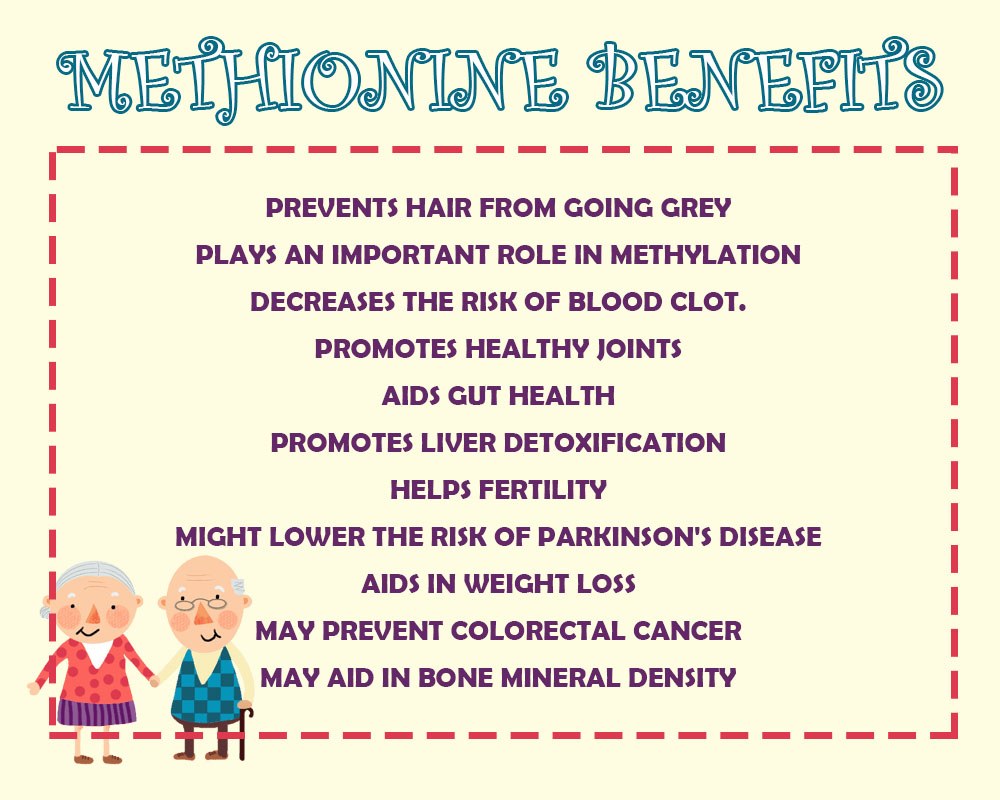
Methionine is an essential amino acid group that must be obtained from food sources.
Like cysteine, methionine contains sulfur and benefits the body through angiogenesis or the process of new blood vessel formation from pre-existing vessels. In 1921, John Howard Mueller first isolated methionine.
What are the Benefits of Methionine?
- Prevents hair greying. Being a sign of aging, greying hair means hair loss and the gradual formation of hydrogen peroxide in hair follicles.
- Plays an important role in methylation or the process of merging three hydrogen atoms, single carbon into a molecule. Methylation is important for fighting stress, producing energy, repairing cells, responding against inflammation, repairing cells damaged by oxidants, repairing DNA, and fighting against viruses and infections.
- Decreases the risk of venous or blood clot. A study concluded that disrupted methylation can lead to a recurring blood clot.
- Promotes healthy joints. Methionine plays an important role in glycosaminoglycan synthesis which is a critical process for forming cartilage and tendons.
- Aids gut health. Like cysteine, methionine ensures healthy intestine.
- Promotes liver detoxification. Methionine aids in the production of glutathione.
- Helps fertility
- Might lower the risk of Parkinson’s disease. One study showed that the deficiency in methionine is correlated with the occurrence of Parkinson’s disease.
- Aids in weight loss. As one of the component of creatine (one of the amino acids that improve the development of muscles and fat reduction), methionine can aid in weight loss and metabolic rate increase.
- May prevent colorectal cancer. Helps in ensuring the formation of antioxidants such as glutathione. A study about the effects of methionine on colorectal cancer supports the conclusion.
- May aid in bone mineral density. A study showed a reduction of bone density on mice fed with methionine restriction diet. Another study showed that methionine restriction altered bone morphology.
What are the Food Sources?
Because methionine contains sulfur, you need food sources that contain sulfur.
The following foods are high in sulfur:
| Asparagus | Broccoli |
| Cabbage | Nuts |
| Avocado | Onions |
| Mustard greens | Tomatoes |
| Garlic | Turnips and greens |
| Kale | Watermelon |
| Bok choy (Chinese cabbage) | |
The following are high in methionine:
| Cheese and Milk | Pike |
| Oats | Cod |
| Egg white | Tuna |
| Soy | Perch |
| Lamb | Pollock |
| Beef | Brazil nuts |
| Beans | Chicken |
| Shellfish | Cereals |
Safety: Is It Risky to Take Too Much Methionine?
It is possible the amino acid is unsafe if you exceed limits. Some sources tell that it is potentially unsafe for infants. The amino acid may also cause acidosis or change in blood acidity and increased homocysteine levels (too much of this chemical is linked to blood and heart vessels diseases). It may also lead to symptoms similar to schizophrenia such as delirium, confusion, listlessness, and agitation.
One study concluded that decreased calorie intake specifically for methionine increased the lifespan of some laboratory animals such as fruit flies and mice.
The Bottomline
Methionine is one of the essential amino acids important for normal body metabolism and function. Too much intake and medication may lead to bad effects on your body. Some studies made that confirms or supports the beneficial or bad effects of methionine still need further clinical trials, study, and research to clear confusion and doubt. Before taking methionine supplements, consult your first your physician.

References:
Wood, J M, et al. “Senile Hair Graying: H2O2-Mediated Oxidative Stress Affects Human Hair Color by Blunting Methionine Sulfoxide Repair.” FASEB Journal : Official Publication of the Federation of American Societies for Experimental Biology, U.S. National Library of Medicine, July 2009, www.ncbi.nlm.nih.gov/pubmed/19237503.
A., Robert. “Assessing the Effects of High Methionine Intake on DNA Methylation.” OUP Academic, Oxford University Press, 1 June 2006, jn.nutrition.org/content/136/6/1706S.full.
Keijzer, Miranda B A J, et al. “Low Fasting Methionine Concentration as a Novel Risk Factor for Recurrent Venous Thrombosis.” Thrombosis and Haemostasis, U.S. National Library of Medicine, Oct. 2006, www.ncbi.nlm.nih.gov/pubmed/17003928.
Nimni, Marcel E, et al. “Are We Getting Enough Sulfur in Our Diet?” Nutrition & Metabolism, BioMed Central, 6 Nov. 2007, www.ncbi.nlm.nih.gov/pmc/articles/PMC2198910/.
Megan R Ruth, and Catherine J Field. “The Immune Modifying Effects of Amino Acids on Gut-Associated Lymphoid Tissue.” Journal of Animal Science and Biotechnology, BioMed Central, 30 July 2013, jasbsci.biomedcentral.com/articles/10.1186/2049-1891-4-27.